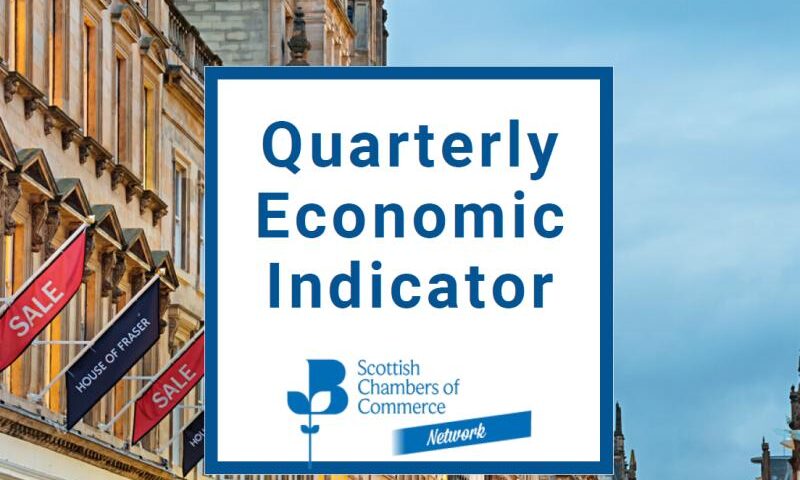SCC Warns Scottish businesses Need Greater Government Support As Economy Enters Recession
Liz Truss Resigns As PM, With New Leader Expected By Next Friday
20/10/2022
More Than 80 Groups Share £320k Council Funding
21/10/2022SCC Warns Scottish businesses Need Greater Government Support As Economy Enters Recession

The latest findings from a leading Scottish business survey by the Scottish Chambers of Commerce (SCC), show the Scottish economy struggling against a growing whirlwind of pressures including increased input costs, inflationary hikes, misjudged economic policy choices by the UK Government, and increased pessimism over the global economic outlook.
KEY FINDINGS:
INFLATION REMAINS A TOP CONCERN
Last quarter saw a record high level of concern from inflation, cited by 92% of all firms. While it has eased over the quarter, it remains at significantly high levels for the survey at 88% of all firms, compared to the average of 35% from 2018 – 2021.
ENERGY BILLS TOP LIST OF COST PRESSURES
The top cost pressure is from utilities such as electricity and gas with it being cited by 80% of firms, followed by labour costs at 72% and then fuel costs at 63% of firms.
FIRMS STILL PLANNING TO RAISE PRICES
8 in 10 of all firms indicate that they intend to raise the prices that they charge over the next quarter, this is a record high for the survey and a figure which has grown exponentially over the year. In comparison, 50% of all firms said they would increase their prices in Q3 2021 last year.
STRUGGLING CONFIDENCE
Cashflow and profits remain weak across all sectors. On balance, all firms have reported a fall in confidence compared to the previous quarter and a more significant fall compared to last year. On a sectoral basis, the construction, retail, and tourism sectors all reported a fall in balance.
Stephen Leckie, President of the Scottish Chambers of Commerce said:
“Frozen investment, faltering confidence, falling cash flow and profits, and a pessimistic global outlook, paint a concerning picture for businesses in Scotland.
“There is more pressure to come in the winter months. The signs of an economic bounce-back don’t look promising as more and more firms are telling us that they have been forced to cancel contracts, projects, or plans to expand, due to soaring costs and difficulty in hiring people.
“Whilst we recognise the strain that has been placed on the public finances, governments in Edinburgh and London must make clear how businesses will be supported to survive through the difficult months ahead and what measures will be put in place to support long-term growth.”
On the Scottish Government emergency budget, Stephen Leckie said:
“The Scottish Government’s Emergency Budget – which also faces immense budgetary pressures – must set out how it intends to protect businesses and industries from the worst effects of the mounting costs crisis. It should also set out how Scotland’s taxation policies such as income tax and LBTT will apply competitiveness to help attract investment and create jobs.
“The emergency budget as well as the December Budget should do more to ease the overall cost burdens on business. The main cost burden on firms could be reduced by cutting the headline poundage rate of Non-Domestic Rates, and delaying changes to the NDR appeals system which are set to add significant bureaucracy and costs to firms.
“In addition, we have constructively engaged with the Scottish Government with the recommendation to delay or roll-back burdensome regulations such as the short-term lets licensing scheme and the deposit return scheme. Acting on this would send the right signal to industry.”
On energy bills, Stephen Leckie said:
“Energy bills continue to be the most pressing cost pressure for firms. The decision by the UK Government to roll back on the energy support for households and firms from next April is a major concern. We urge the Chancellor to engage with the business community urgently and provide clarity on the proposed targeted support beyond April for the most vulnerable sectors and avoid cliff-edge scenarios.
“While upping the windfall tax on oil and gas firms to pay for energy bill support continues to be argued by politicians, we would urge the Scottish and UK Governments to prioritise industry engagement on their future plans which could incentivise or inhibit business and investor confidence. The priority focus should be on bolstering our energy efficiency, security of supply and a just transition.”
On inflation and price rises, Stephen Leckie said:
“Producer Price Inflation now stands at 20% which has led to a record number (80%) of firms indicating that they intend to raise the prices they charge next quarter.
“With the Bank of England set to raise interest rates again in the coming weeks, businesses are caught between rising input and borrowing costs.
“We need to see a clear long-term economic prospectus from the UK Government which will provide a stable environment for investment.”
On labour market shortages, Stephen Leckie said:
“Along with rising costs and energy bills, labour shortages are among the greatest challenge facing firms and must be urgently addressed. The survey indicates that recruitment difficulties have been on the rise through 2022 and have significantly increased since 2021, with the manufacturing and tourism sectors seeing the most difficulty hiring people.
“Whilst we welcome the impending review of the Shortage Occupation List, the Migration Advisory Committee’s recommendations are unlikely to be published until spring 2023. This is simply not quick enough and other ways should be considered to alleviate labour pressures over winter, such as the issuing of short-term visas for critical sectors such as logistics and social care.”
Commenting on the results, Mairi Spowage, Director at the University of Strathclyde’s Fraser of Allander Institute, said:
“It has felt like the most extraordinary few weeks of political turmoil. The “mini” budget and the associated market turbulence have put upward pressure on the costs of government borrowing – and in turn, the costs of borrowing across the economy.
“The U-turns we have seen have, at the time of writing, calmed the markets somewhat. The new chancellor will be setting out his Medium-Term Fiscal Plan on 31st October. Given the mistakes that have been made by his predecessor, it is likely that Jeremy Hunt will have to go further in terms of spending restraint and potential tax rises compared to what may have been the case without the chaos.
“Closer to home, we are expecting the Scottish Government to present their Emergency Budget review next week.
“Whilst this is likely to focus on areas where further savings have been identified to help fund public sector pay settlements, it will be interesting to see what further measures are announced to support households and businesses through the next few months.”
NOTES TO EDITORS:
- This survey was conducted in August & September of 2022. 280 firms responded to the Q3 2022 edition of the survey. Fieldwork was paused during the period of national mourning for her late Majesty Queen Elizabeth II.
- 95% of respondents to the survey were SMEs: these are businesses with less than 250 employees.
- The Quarterly Economic Indicator is Scotland’s longest-running economic survey of its kind, operating since 1990.
- Scottish Chambers of Commerce is Scotland’s largest business network with over 12,500 business members, across a network of 30 regional Chambers of Commerce, providing business support, business intelligence and business connections.
FEEDBACK FROM BUSINESS:
- “Rising costs are a real worry and redundancies are the result. The Deposit Return Scheme coming live in August 2023 is a massive concern as the costs and admin involved are unworkable for small producers.” – Manufacturing firm in the Lothians
- “Very concerned about the reduced levels of spend from customers when they have less disposable income. Balancing increased prices of raw materials against not increasing our own prices to lose sales is challenging.” – Retail firm in the Scottish Borders
- “Hospitality VAT is too high – we are constantly trying to save for the VAT return but it’s a real struggle. There is never any money left for investment or profit. We don’t know if we have enough cashflow and business to get through the winter. We haven’t had a good summer to get us through the winter.” – Tourism firm in the Highlands
